First national dialogue on anticipatory action held in Nepal
The first national dialogue on anticipatory action was organized in Nepal in April 2022. This brought together the key decision-makers from relevant government, humanitarian and donor agencies to discuss the current status of anticipatory action in Nepal and to define its future.
The dialogue focused on four thematic areas: (1) framing forecast-based action mechanisms; (2) identifying anticipatory actions for different disasters; (3) financing mechanisms for anticipatory action; and (4) shock-responsive social protection as a way to reach affected populations before, during and after disasters. The expected outcomes were to:
- develop a common understanding of anticipatory action and the direction it is taking in Nepal
- prepare a consolidated matrix detailing the work and geographical focus of organizations involved in anticipatory action; this will be made available in the government’s disaster management portal and inform the government’s decision-making processes
- prepare a list of recommendations to contribute to national policy efforts focused on advancing the implementation of anticipatory action in Nepal.
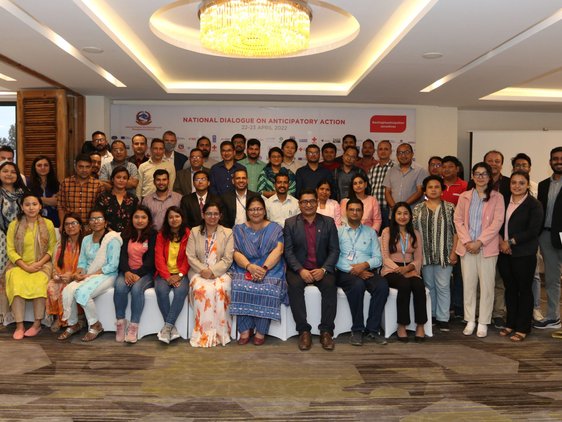
The national dialogue was organized by NDRRMA with support from the forecast-based action and shock-responsive social protection community of practice, with technical support from the Nepal Red Cross Society and the Danish Red Cross. It was attended by all key disaster management stakeholders. © Danish Red Cross
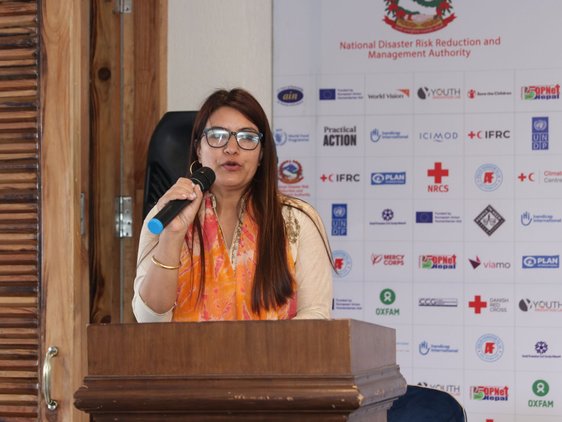
Niru Shrestha, senior programme officer, Danish Red Cross, moderates a session to identify possible early actions for floods, drought and cold waves. © Danish Red Cross
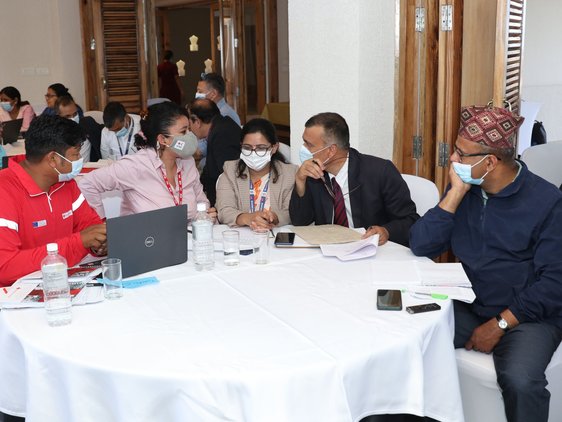
The National Dialogue provided a good platform to bring together key decision-makers from relevant government, humanitarian and donor agencies to discuss the current status of anticipatory action in Nepal and to define its future. © Danish Red Cross
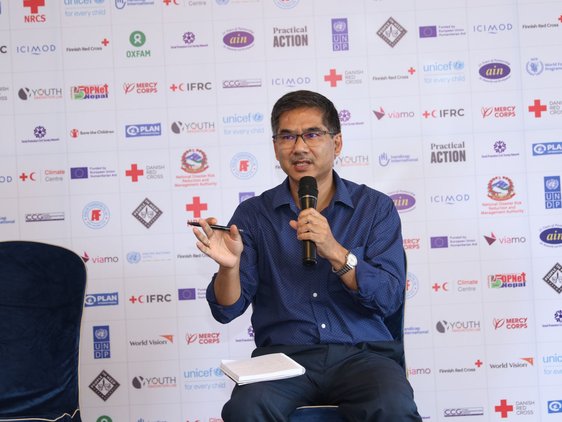
Piush Kayastha, programme officer, European Civil Protection and Humanitarian Aid Operations, shares his insights on the various opportunities available for financing anticipatory action in Nepal. © Danish Red Cross
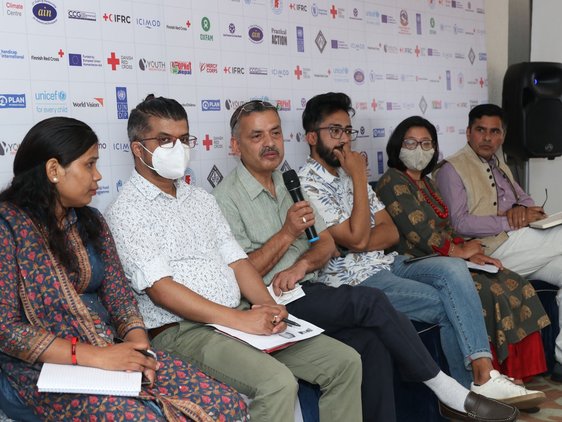
Panelists from UNICEF, WFP, the World Bank, Mercy Corps, and local and federal government agencies discuss the role of social protection systems in building resilience, as well as meeting the shock-related needs of populations before, during and after disasters. © Danish Red Cross
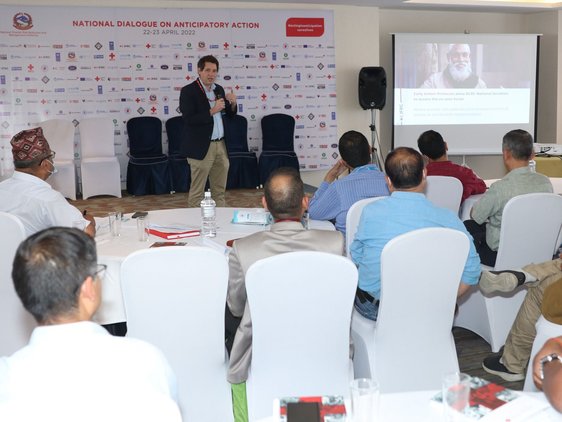
Herve Gazeau, programme coordinator, IFRC, presents the Disaster Response Emergency Fund (DREF) as a source of funding for early actions based on pre-agreed meteorological forecast information. © Danish Red Cross
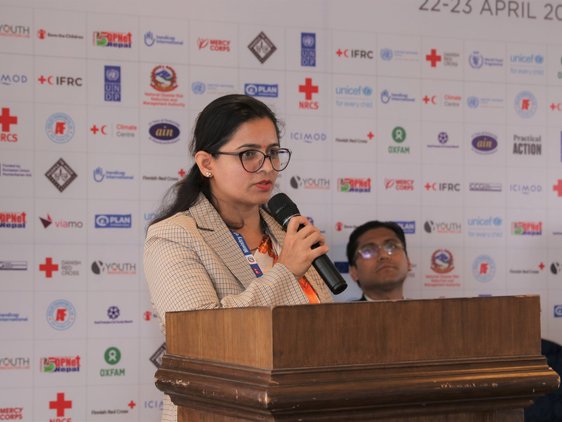
Anita Niraula, NDRRMA, shares the progress on the shock-responsive social protection guideline and invites participants to provide their contributions. © Danish Red Cross
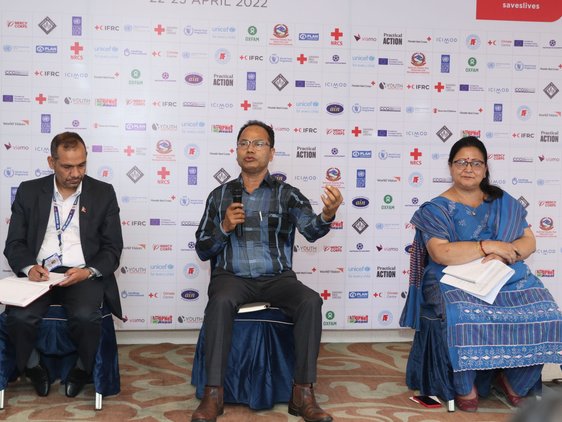
Panelists from the NDRRMA, Practical Action and ICIMOD discuss framing the forecast-based action mechanism, various challenges (e.g., with forecast accuracy and risk communication) and solutions to overcome them. © Danish Red Cross
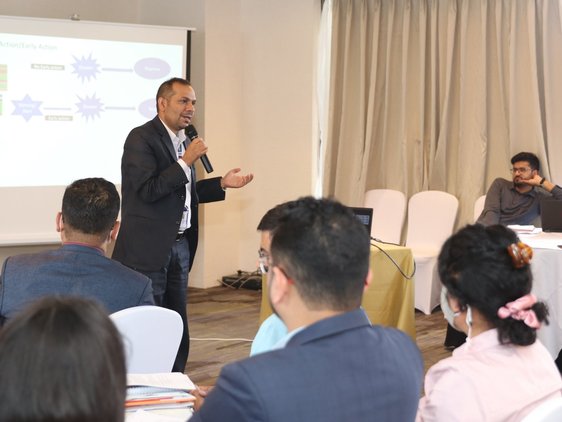
Rajendra Sharma, joint secretary, NDRRMA, shares the government’s various initiatives to streamline disaster management and anticipatory action work in Nepal. © Danish Red Cross

The national dialogue was organized by NDRRMA with support from the forecast-based action and shock-responsive social protection community of practice, with technical support from the Nepal Red Cross Society and the Danish Red Cross. It was attended by all key disaster management stakeholders. © Danish Red Cross
Niru Shrestha, senior programme officer, Danish Red Cross, moderates a session to identify possible early actions for floods, drought and cold waves. © Danish Red Cross
The National Dialogue provided a good platform to bring together key decision-makers from relevant government, humanitarian and donor agencies to discuss the current status of anticipatory action in Nepal and to define its future. © Danish Red Cross
Piush Kayastha, programme officer, European Civil Protection and Humanitarian Aid Operations, shares his insights on the various opportunities available for financing anticipatory action in Nepal. © Danish Red Cross
Panelists from UNICEF, WFP, the World Bank, Mercy Corps, and local and federal government agencies discuss the role of social protection systems in building resilience, as well as meeting the shock-related needs of populations before, during and after disasters. © Danish Red Cross
Herve Gazeau, programme coordinator, IFRC, presents the Disaster Response Emergency Fund (DREF) as a source of funding for early actions based on pre-agreed meteorological forecast information. © Danish Red Cross
Anita Niraula, NDRRMA, shares the progress on the shock-responsive social protection guideline and invites participants to provide their contributions. © Danish Red Cross
Panelists from the NDRRMA, Practical Action and ICIMOD discuss framing the forecast-based action mechanism, various challenges (e.g., with forecast accuracy and risk communication) and solutions to overcome them. © Danish Red Cross
Rajendra Sharma, joint secretary, NDRRMA, shares the government’s various initiatives to streamline disaster management and anticipatory action work in Nepal. © Danish Red Cross
The event was initiated and organized by the government of Nepal and the National Disaster Risk Reduction Management Authority (NDRRMA), with support from the forecast-based action and shock-responsive social protection community of practice, and technical support from the Nepal Red Cross Society and the Danish Red Cross. Mr Anil Pokharel, chief executive of the NDRRMA, encouraged such dialogues to be held more frequently to streamline work on anticipatory action in Nepal. He also expressed his assurance to work collaboratively in the coming days.
Through this platform, I call for support from all the agencies and stakeholders to work in collaboration to further the work on anticipatory action. We need to prioritize capacity building on anticipatory action, utilize the knowledge and experiences from all of our partners, encourage knowledge exchange and develop [a] ‘phase wise’ action plan to take anticipatory action forward.
Anticipatory action was first piloted in Nepal by the Nepal Red Cross Society in 2018, with financial support from the European Civil Protection and Humanitarian Aid Operations. Since then, there has been rising interest in this approach. Significant improvements in the country’s weather forecasting system and the transfer of power to local government units – especially in disaster management – have created a favourable environment to expand and institutionalize anticipatory approaches in the country. There has also been increasing interest from the donor community and humanitarian agencies.
However, there remains a need for the government, donors and humanitarian agencies to move ahead in a coordinated manner and ensure that policies are favourable to this approach. The key takeaways from the first national dialogue will contribute to this, informing national policies that are more favourable towards institutionalizing and implementing anticipatory action in Nepal.
Further resources
For further details about this event, please see the event proceedings.
By Alina Karki, senior documentation officer, and Hemanta Dangal, senior social protection officer, Danish Red Cross
The forecast-based action and shock-responsive social protection project in Nepal, funded by the European Civil Protection and Humanitarian Aid Operations and implemented by the Red Cross, has established a community of practice to contribute to the development of these approaches in the country. This multi-sector, multistakeholder group supports open and constructive discussions and coordination among all interested parties that want to contribute meaningfully to this topic. For further details, please contact Niru Pradhan.
